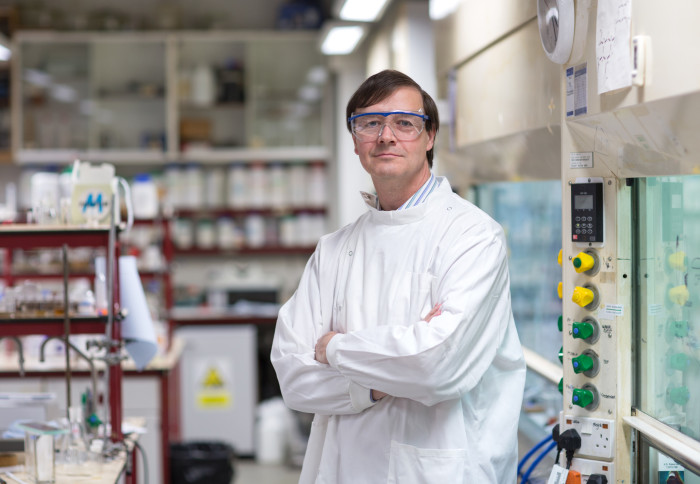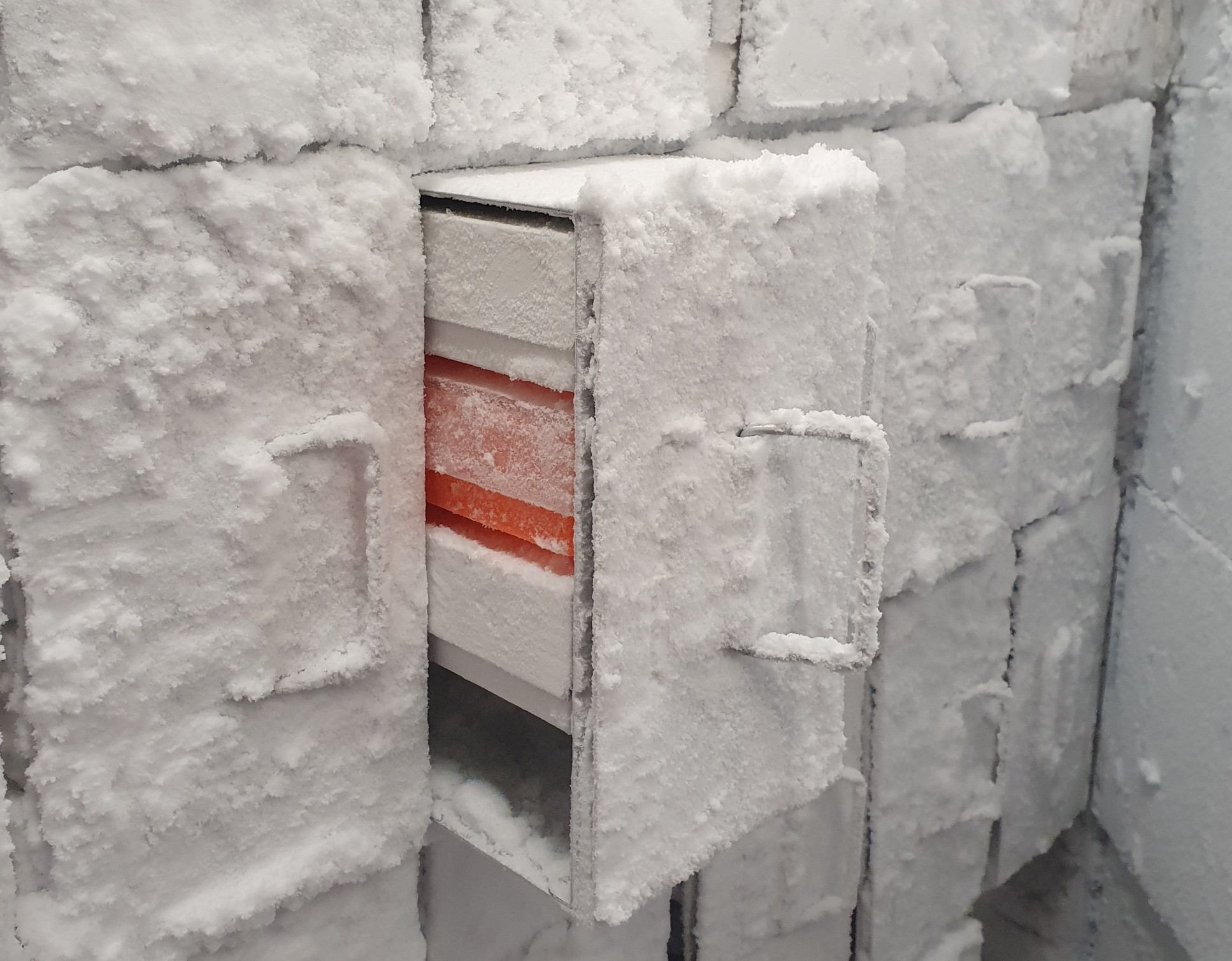Imperial research labs take on the sustainability challenge one degree at a time
by Amy Trask

Professor Paul Lickiss, Professor of Organometallic Chemistry and Imperial's Academic Leader in Sustainability
How simple changes like turning up the temperature in your freezer can help reduce energy waste and make big savings
Reducing the environmental impact of research laboratories will be key to achieving Imperial College London’s target of becoming a sustainable and net-zero carbon institution by 2040, set out in the College’s Sustainability Strategy launched this week.
Laboratories are typically responsible for 60-65% of electricity consumption within research institutions and some produce large amounts of waste; approximately 1.8% of the world’s plastic production is attributable to bioscientific research.
At Imperial, researchers and lab managers are already taking steps to reduce the environmental impact of their labs and facilities. One initiative helping them to do just that is LEAF.
What is LEAF?
The Laboratory Efficiency Assessment Framework (LEAF) is an environmental accreditation scheme designed to improve sustainability within higher education teaching and research.
Covering a multitude of criteria, from waste disposal to procurement, energy efficiency to chemical management, the framework enables individual lab managers from all departments to quantify their environmental and financial impact.
The aim of the project is to reduce carbon footprints and improve sustainability of individual labs, whilst reducing costs.
If every lab participated in LEAF it would make a huge difference Professor Paul Lickiss Academic Leader in Sustainability
Not all labs were created equally, but LEAF’s platform is universal. Professor Paul Lickiss, Imperial’s Academic Leader in Sustainability, emphasises this quality: “It covers pretty much everything you can imagine in a laboratory”.
Participants are asked to complete a workbook that makes you assess how individual items contribute to your footprint in a thorough, wide-ranging, and organised manner.
Prof. Lickiss explains that “you probably miss half the things that LEAF talks about” when assessing your lab independently. “It’s as thorough as asking not only if you have a fridge, but if you have a management system in place? Do you make sure it’s defrosted regularly?”
In the long term, Prof. Lickiss hopes that all labs will implement a sustainability review process. “If every lab participated in LEAF it would make a huge difference,” he says.
Imperial’s progress
At Imperial, LEAF is assisted by the Estates Operations team which oversees facilities and maintenance. Within the department, Hari Haren and Rosie Young were both fundamental in accelerating the success of the programme around the College.
Hari explains how, as a research-orientated university, looking at labs through the lens of LEAF has helped improve efficiency and reduce costs, getting to the heart of research sustainability.
Despite the challenges that arose from lockdown, 21 out of the 50 labs who registered interest in the 2019-20 period were able to complete the process, with six silver and 15 bronze LEAF certifications being awarded.
This translated to an estimated £70,000 in savings and 120 tonnes of CO2e avoided – equivalent to the annual CO2 emissions produced by .20 homes’ electricity consumption.
With these savings in mind, Hari urges that labs who couldn’t take part last year “come forward and be a part of the process” in 2021 to share best-practice and advance Imperial’s progress.
10 degrees of sustainability
One everyday appliance that could be lurking in the corner of your lab, consuming vast amounts of energy, caught the attention of one of our Technical Operations Managers, Allison Hunter. The humble freezer.
“They’re white goods in white labs so you tend not to see them,” says Allison. Prior to her position at Imperial, Allison was employed at King’s College London where she used an energy monitor to measure just how much the camouflaged refrigeration units consumed.
A university-wide audit revealed that Kings had 1,855 units, which cost approximately £480,000 in electricity per year. For her continued efforts in reducing their consumption, Allison was awarded a prestigious S-Lab Award in 2015.
The data she produced, and conservation measures introduced as a result, have been combined with other sources in the LEAF model and guidance documents of the international Freezer Challenge.
The Challenge audits environmentally positive actions of universities and research centres regarding cold storage. Imperial’s Djordje Gveric, Multiple Sclerosis and Parkinson’s Tissue Bank Manager, was one of the individual laboratory winners.

One measure encouraged by the Challenge is raising ultra-cold freezer temperatures from -80°C to -70°C. This ten-degree difference reduces energy usage by up to 28%, without compromising sample integrity.
Further protocols include regular defrosting and maintenance, procuring energy-efficient models, tracking samples so that only wanted ones are stored, and optimal use of internal space.
Choosing a commercial freezer can be a challenge as there are currently no standards regarding their energy efficiency. Allison has been at the heart of efforts to provide better clarity on this issue, lobbying the UK and EU to implement new legislation.
Top tips for labs
Ultimately, Allison stresses that the “implementation of LEAF, and environmental improvement in general, relies on the expertise and involvement of laboratory technical staff,” and in the words of Prof. Paul Lickiss, “sustainability is everybody’s responsibility”.
With small savings across hundreds of labs adding up, what exactly can you do to ensure your lab is as sustainable as it could be?
- Awareness: Be aware of all your equipment and try spot your high energy consumers. Hari and Paul highlight how fume cupboard sashes generally need to be lowered when not in use to reduce room temperature control costs. Putting notices up around the lab to remind staff and students to maintain best practice could help remind them to do so.
- Efficiency: Ask your suppliers for energy and/or water consumption figures before you purchase. Include such requests in your tendering processes for equipment. Cheap equipment can often disguise expensive lifecycle costs.
- Management: The most energy efficient options still require maintenance and management to ensure they are effective. Allison recommends racks in refrigeration units to utilise space efficiently and back-up freezers to assist with regular freezer defrosts.
- Repurpose: When purchasing or getting rid of equipment/products, maintain a lifecycle mindset. Repurpose where possible and check no one in your faculty or institution has what you need before you buy it! Warpit helps lab owners find new owners for pre-loved equipment. For chemical labs Paul highlights how LabCup (a chemical management system) prevents over purchasing of chemicals.
Article text (excluding photos or graphics) © Imperial College London.
Photos and graphics subject to third party copyright used with permission or © Imperial College London.
Reporter
Amy Trask
Department of Life Sciences